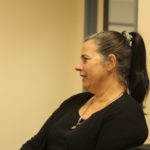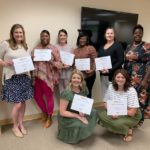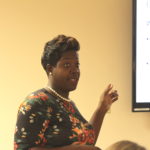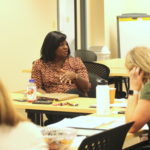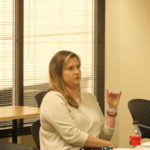“It’s about being supportive—parents supportive of their kids, practitioners being supportive of parents and us being supportive of practitioners,” said Abby Wilson, director of community initiatives at Children’s Trust of South Carolina. “The bottom line is we’re trying to deliver Triple P as best as we can so that families get the benefit of it; supporting this network of practitioners is a way we can do that.”
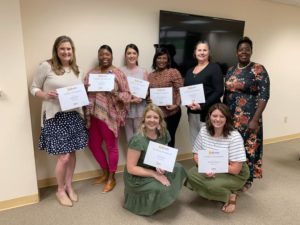
Triple P coordinators and coaches stand with Toyinda Smith after completing her coaching skills course.
As the only statewide organization focused on preventing child abuse and neglect, Children’s Trust supports the implementation of the Positive Parenting Program, also known as Triple P, in the state.
From parenting seminars to specialized services, Triple P helps parents build strong, healthy relationships, confidently manage their children’s behavior, and promote positive childhood development. Local coordinating agencies manage the program and work with a variety of community-based service organizations—pediatric practices, nonprofits, libraries, schools and churches—to provide services to families.
Since 2018, Children’s Trust has partnered with The Duke Endowment and Mary Black Foundation to support the expansion of Triple P in Georgetown, Greenville and Spartanburg counties. There are also other Triple P providers throughout South Carolina.
Children’s Trust is now working to build a statewide network of practitioners so that they can in turn support their local partners and reengage service providers after two years of pandemic-related changes.
The organization sponsored Champion Influence®, a 6-week skills coaching course led by master coach, business consultant, speaker and author Toyinda Smith. Four Triple P coordinators from the coordinating agencies in Georgetown, Greenville and Spartanburg and Children’s Trust Triple P coaches attended.
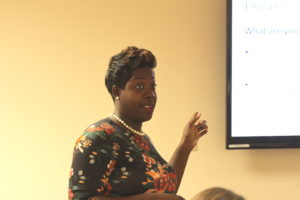
Toyinda Smith discusses coaching skills with the Triple P coordinators.
In the training room with the group of Triple P coordinators, Smith was warm, confident and encouraging. She was straightforward in her mission to help the participants uncover their goals for themselves and equip them with practical strategies to solve problems—and to help the participants learn how to do the same for their local Triple P providers.
She explored with the group how the purpose of coaching is to help people reach their potential so they can maximize their performance. “It is about raising awareness and responsibility—helping individuals learn rather than telling them the answers,” Smith said.
She guided the group through her proprietary coaching process model which involves guiding people in determining their goals, learning strategies for reaching them, overcoming potential barriers and being accountable.
“You’ll have individuals that you coach that will have something inside of them from a past experience in their formative years that will stop them,” said Smith. “As coaches, we come alongside them and help them to think differently.”
Wilson, who leads the Triple P team at Children’s Trust, is excited about the foundation being built.
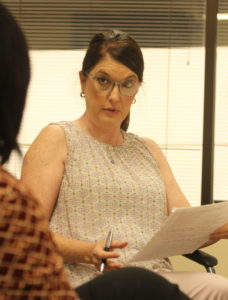
Nicole Sheppard of Greenville First Steps role plays a scenario with another participant during the coaching skills course.
“Our goal is to create the space where folks can learn together, problem solve together and come up with solutions as Triple P providers,” Wilson said. “So having this coaching course is a first step for us. It’s giving us a common language for our Children’s Trust coaches and our coordinators so that they can work together to really build this network of providers across the state.”
Throughout the course, Smith repeated, “Leaders get results through the people they lead.” In the last session, the coordinators each shared skills they learned to be better leaders during their time together.
One coordinator said she now “reads the room differently” during her day-to-day work with local service providers. Another participant shared she’s more likely to “think first and talk second.” Each member of the group expressed they are more curious, intentional and self-aware as they work to strengthen relationships with their partners and serve families in their communities.
“You have to meet people where they’re at, but don’t leave them there,” said Grace Sandoz, wellness coordinator at Tidelands Health in Georgetown, South Carolina.



